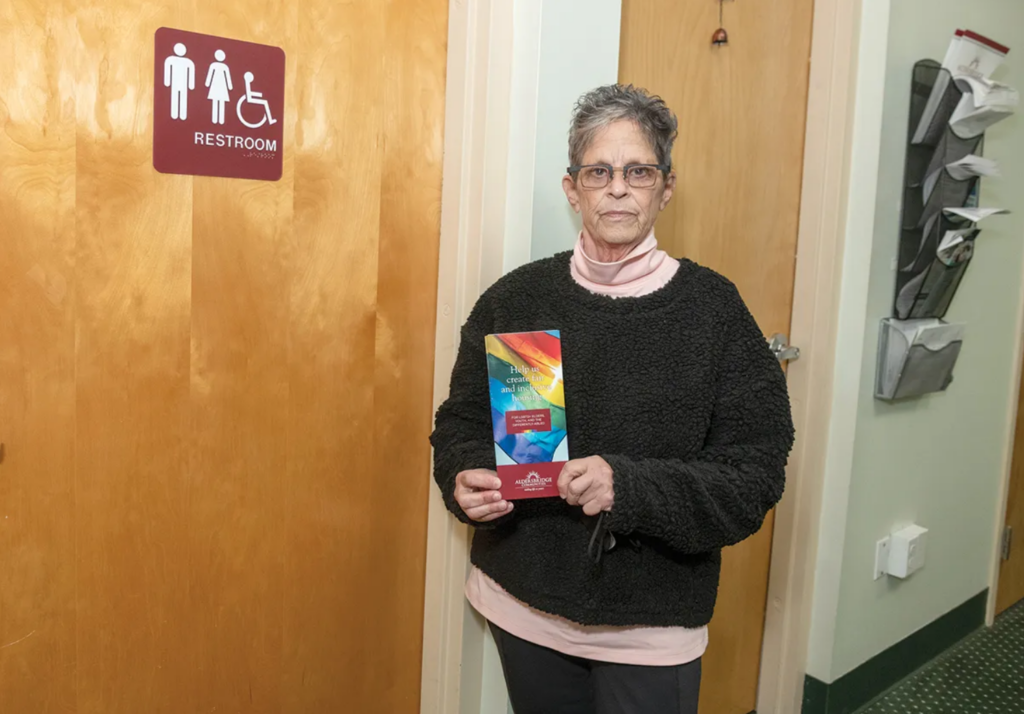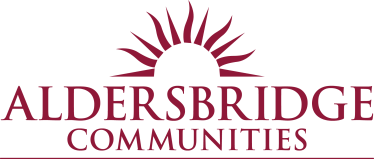
SPECIAL DESIGNATION: Jodi Glass, an audiologist and trustee of Aldersbridge Communities, which operates assisted living facilities in Rhode Island, says the organization’s sites have been certified LGBTQ Safe Zones since 2019. Part of the requirements are gender-neutral bathrooms. / PBN PHOTO/MICHEAL SALERNO
It’s not a scenario that would be allowed at Aldersbridge Communities, which operates assisted living facilities in East Providence, Providence and Woonsocket, which is one of more than 40 health care providers in Rhode Island to become certified as part of the LGBTQ Safe Zone Program launched by Blue Cross & Blue Shield of Rhode Island in 2015.
The company is the only nursing home operator to become certified as an LGBTQ Safe Zone since it did so in late 2019, said Jodi Glass, an audiologist who sits on the board of trustees for Aldersbridge Communities.
“When I started doing work with folks who are in elder care, they would just go back into the closet. It was too painful,” said Glass, who helped introduce the safe zone certification to the organization, showing fellow board members a 2010 documentary called “Gen Silent” about seniors in Boston hiding their orientations to survive in the long-term health care system.
“These are folks who would really be isolated,” Glass said. “They would go to an elder site and not be who they are. It’s starting a life over again, where you’re not yourself. You’re just someone being housed. And that’s just pathetic. Nobody deserves that.”
The LGBTQ Safe Zone Program was created to help address the historical challenges facing the gay, lesbian and transgender community in accessing health care and offering an environment that’s inclusive, welcoming and affirming of their orientation. The goal is to ensure that members of the LGBTQ community have safe, equitable access to health care without fear of discrimination, according to Blue Cross & Blue Shield of Rhode Island.
Certification requirements for LGBT Safe Zones include gender-neutral bathrooms; annual staff training specific to the care of LGBTQ patients; clearly posted policies offering protection for patients and staff from discrimination based on gender identity or expression; inclusive intake forms, documents and procedures; and a public commitment to connecting with and serving the LGBTQ community.
Many safe zones also have signs to distinguish themselves and express pride in the designation, including the rainbow-colored upside-down BCBSRI Safe Zone triangle logo.
The program is unique and offered only through Blue Cross & Blue Shield of Rhode Island, spanning a variety of services, including behavioral and mental health, primary care, dental care, and organizations that assist victims of sexual assault and domestic violence across the state, according to the health insurance agency.
The latest provider to become certified as an LGBTQ Safe Zone is Coastal Medical Waterman Pediatrics, a group practice in East Providence. It’s the first pediatric primary care provider in the program, according to Blue Cross.
“LGBTQ youth face an even greater risk for negative health outcomes and severe threats to their physical and mental health and well-being than LGBTQ adults do,” said Jenny Bautista-Ravreby, BCBSRI’s diversity, equity and inclusion manager. “As we continue to do all we can to support young Rhode Islanders navigating their own physical and mental health and well-being, we invite other pediatric providers and specialists to consider applying to the program.”
Dr. Elizabeth Lange, a pediatrician at Coastal Medical Waterman Pediatrics and president of the Rhode Island Medical Society, said she’s glad about what it means for LGBTQ children treated by her practice.
“We want kids and teens to know that when they see the Safe Zone logo on the door at Waterman Pediatrics, they will receive compassionate, affirming care, and that we have resources at the ready for both patients and their families,” Lange said. “We know that school can be especially challenging for LGBTQ [youths] as well, so we have developed inclusive communications to schools, providing the patient’s name if it differs from their legal name in letters to the school.”
Scott Gowrie, corporate social responsibility specialist at BCBSRI, said applications to become a certified LGBTQ Safe Zone are processed on a biannual basis, with deadlines for submission on Feb. 15 and Aug. 15.
“Sometimes we have collaborative partnerships with applicants to make improvements to their procedures and policies to help them get to a point where they need to be to become certified,” Gowrie said. “There’s a lot of enthusiasm around the certification, particularly among prospective applicants that are already showing a commitment to LGBTQ affirmation. They see it as a journey.”
Providers and other community-based organizations can apply to become an LGBTQ Safe Zone by going online to www.bcbsri.com/providers/safezone-program.
Back at the Aldersbridge Communities facility in East Providence, Glass said the introduction of an LGBTQ Safe Zone doesn’t always mean that everyone who is not currently accepting of gay people will change their ways. But it’s making a difference, prompting conversations and making people feel welcome who otherwise would feel out of place.
“I have to believe that in many cases it may have softened a heart,” Glass said. “It’s pretty groundbreaking what we’re doing around our building.”
As seen in Providence Business News: Reach Staff Writer Marc Larocque at Larocque@PBN.com
